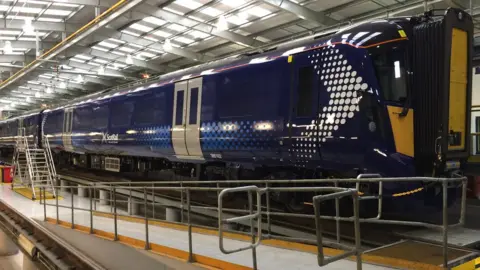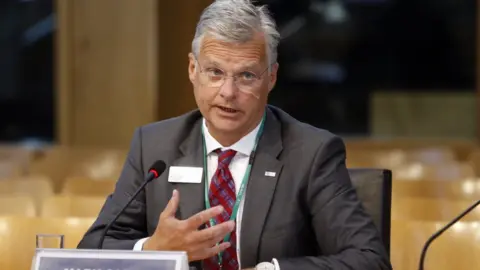Plan for Edinburgh-Glasgow electric trains delayed
 BBC
BBCA project to improve the Glasgow to Edinburgh rail line, which has faced delays and rising costs, has been held up a further three months.
Network Rail chief executive Mark Carne said he was "very confident" the latest deadline would be met, though he could not give a "cast-iron guarantee".
He told a Scottish Parliament committee that no more taxpayers' money would be needed for the project.
The first electric services are now due to start running in October.
A deadline set in January 2014 had aimed to achieve this milestone in 2016, and this was later pushed back until July 2017.
The Edinburgh Glasgow Improvement Programme (EGIP) was costed at £742m in January 2014 - up £90m on the previous estimate.
'Funding ceiling'
On Tuesday in parliament, Conservative MSP Jamie Greene had criticised Transport Minister Humza Yousaf for "passing the buck" to Network Rail when it came to explaining delays and rising costs.
Mr Greene had pointed to media reports last year that suggested the project had risen in cost by £32m due to faulty electrical equipment.
Mr Yousaf had said responsibility for delivery of the project lay with Network Rail and there was a "funding ceiling" which he did not expect to be breached.
 Scottish Parliament
Scottish ParliamentGiving evidence to the Rural Economy and Connectivity Committee, Mr Carne refused to be drawn on the total cost of the project.
He said the costs were subject to commercial dispute, but said he was confident Network Rail would will live within the overall funding limit.
The Holyrood committee heard the latest delay related to the replacement of 300 components that attach the electrical wires to the structure and which had begun to fail, posing a potential safety risk.
Mr Carne said: "I'm not happy with the way the EGIP project has run, the electrification part of it, and we've been drilling into it in some depth to turn it around and to improve it.
"I'm encouraged by the progress that the team here are making in Scotland to turn that around."
